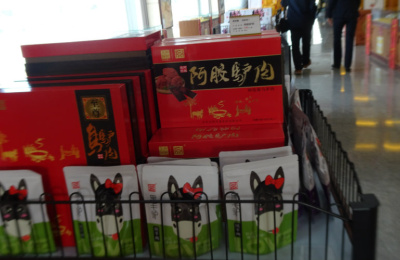For the first time, The Donkey Sanctuary and its Brazilian partners, formed as the National Donkey Taskforce, have significant evidence that the international trade in donkey skins is now reaching South America.
Donkeys living in the wild in Brazil are now being targeted by traders and ‘harvested’ for their skins, which are used to produce the traditional medicine, ejiao. We believe these traders are exploiting a law that has been in place for over 20 years that all livestock found roaming on highways (feral or owned) are confiscated and sent to holding compounds, with limited welfare measures in place to protect the animals.
We have shocking footage from a compound in Itapetinga, in the southwest of Bahia state, showing hundreds of donkeys being kept in appalling conditions. It is believed that the 300 donkeys in this compound were living in the wild before being captured and transported in cramped trucks over huge distances.
Thanks to pressure from The Donkey Sanctuary and our partners in the National Donkey Taskforce, the Itapetinga facility was closed down.
We were so shocked by the information sent by our Brazilian partners that we dispatched an emergency team, including a vet, to join the National Donkey Taskforce and investigate further, including a visit to the compound and meetings with government officials and legal experts.
When the team visited the compound in Itapetinga, now known locally as ‘the donkey graveyard’, the only evidence of donkeys being there was bones and dung in the scrubland and some putrid-smelling burial mounds near the entrance, which are patrolled by wild dogs and vultures.

The team located a new abattoir near to the compound that claims to kill up to 250 donkeys a day, which joins two others in the Bahia state, Amargosa and Simoes Filho. All three are licensed to export meat and skin.
According to a local truck driver we talked to, he delivers up to 50 donkeys a day to the new facility in Itapetinga, after travelling 1,000km journeys over three days from the Pernambuco state. He claims that some donkeys die in transit or arrive lame.
Simon Pope, campaigns manager at The Donkey Sanctuary and part of the team in Brazil, said: “We need to throw a light on this – what is happening to donkeys in Brazil is inhumane and sickening and we believe the Itapetinga compound is just the tip of the iceberg.
“Other donkey slaughterhouses are currently operating in Brazil and we suspect each of these will have a similar slaughter pen where starving, scared donkeys are awaiting their fate.
"We want to see the state governments take similar action to that in Itapetinga where there is evidence of inhumane transport and slaughter, against all recognised animal welfare standards.”
We are only able to send a team to investigate this situation in Brazil thanks to the generous ongoing support we receive from people like you who kindly donate, adopt a donkey or visit our sanctuaries. This support means that we can be responsive to donkeys in times of desperate need.
We are calling on Brazil to halt the trade in donkey skins, including closing the slaughterhouses, holding compounds and stopping long-distance transport until the industry can meet international animal welfare standards in the country and it is proven to be both humane for donkeys and sustainable.
If you’d like to help further, please make a donation by clicking the button below and giving whatever you can. Keep checking our website and social media pages for the latest updates on our progress in Brazil and to find out other ways in which you can help.
